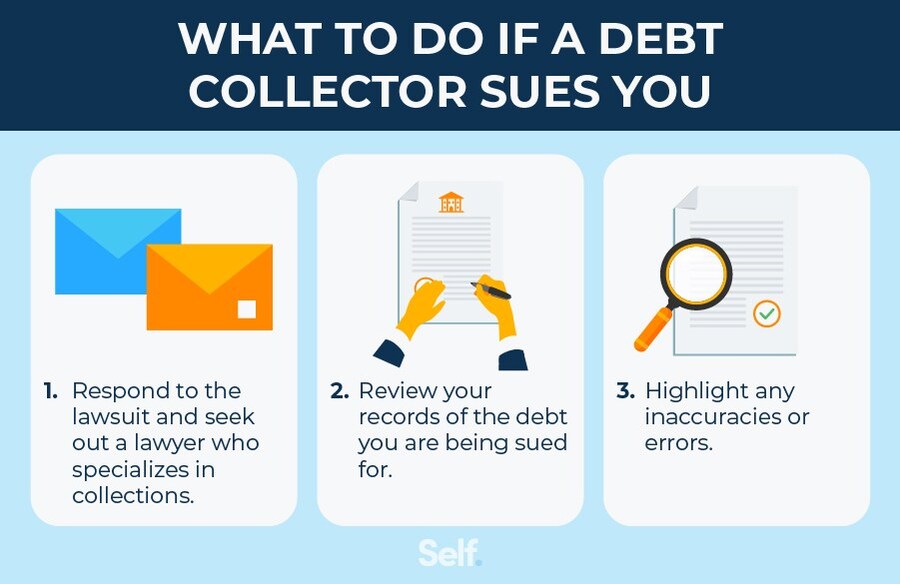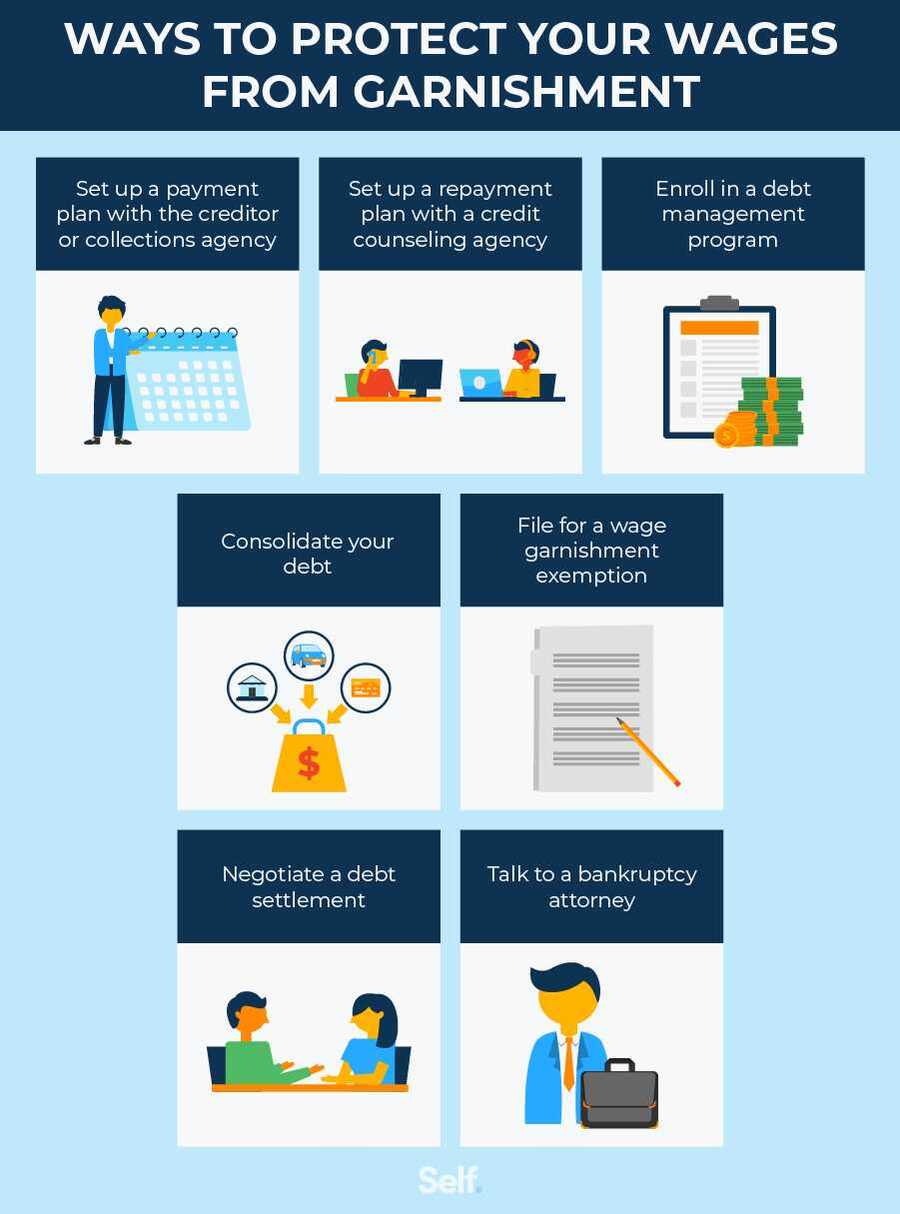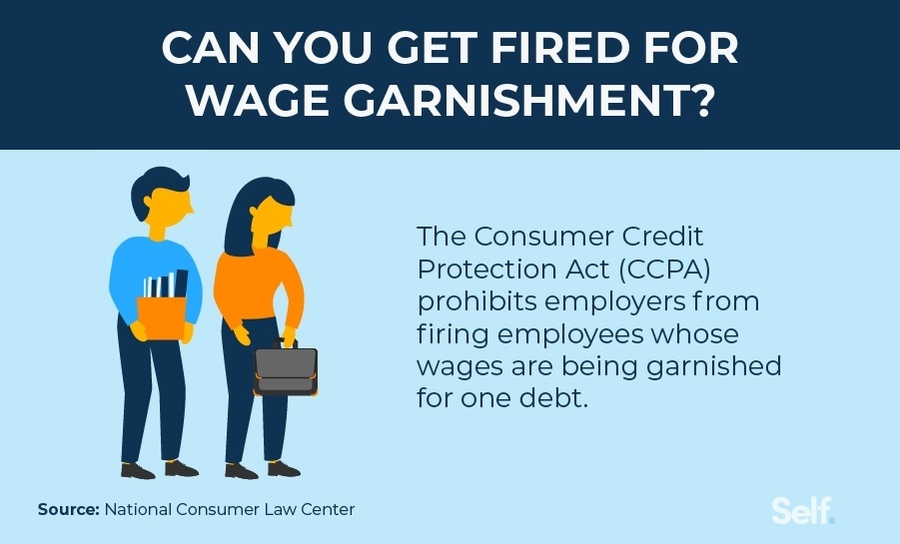How to Stop Wage Garnishment
Published on: 03/08/2023
A wage garnishment order is a tough thing for most people to deal with, especially when you are already struggling financially. Whether you are currently having your disposable earnings garnished or a court has signed off on a creditor’s plan to garnish your wages following collection efforts, you may be wondering what you can do to prevent this action.
This guide breaks down what wage garnishment is, how it happens, and how you might stop it. We also discuss how much your wages can be garnished and help you better understand what a claim of exemption actually means.
Table of contents
- How does wage garnishment happen?
- What to do if a debt collector sues you?
- Ways to protect your wages from garnishment
- How much of your wages can be garnished?
- Can you get fired for wage garnishment?
- What wages cannot be garnished?
- How long does wage garnishment last?
- Reach out for assistance
How does wage garnishment happen?
Under wage garnishment or bank garnishment, creditors have a court order that allows them to take money from your paycheck or directly from your bank account to collect a debt, which has typically been charged-off or not paid for a specified period of time.[1] The types of debt that may be collected through garnishment can include different types of debt , like charged off consumer loans or student debt, past due child support, alimony, tax debt and rent.[2]
However, state and federal laws not only limit how much can be garnished, but the federal government also protects certain federal benefits, such as VA and Social Security benefits, that get directly deposited into your bank account.[3]
If you do get sued by a creditor, be sure to find a lawyer who specializes in collections to offer you legal advice and represent you in court. Find recommendations through legal aid offices to see if you qualify for at least a free consultation or reduced fees.[4]
Although most creditors must sue you in court to win a court order for garnishment, certain debts you owe the federal government, such as tax debt, doesn’t need a court order.[1] Regardless, if you fail to respond to a court summons or the court rules against you, the collector receives a judgment that allow them to do one of the following things:[5]
- Place a lien against your property.
- Freeze all or part of the funds in your bank account.
- Garnish funds from your bank account.
- Garnish your wages.[3]
Not all debts are collectible in court: Creditors have a time limit to sue for a debt, and if they don’t meet that statute of limitations, their claim may be time-barred. However, this depends heavily on the type of debt you have and the wage garnishment laws in your state, and just because you can’t be sued in court doesn’t mean the debt goes away. You still owe the debt, and debt collectors may still attempt to collect on it through calls and the notices in the mail even after the statute of limitations has expired.[6]
What to do if a debt collector sues you?
If you do get sued, don’t panic and definitely don’t ignore the lawsuit, which may result in a default judgment. Instead, take the following actions:[7]

- Respond to the lawsuit. To best protect your rights, find a lawyer who specializes in collections to help you respond to the lawsuit and to give you legal advice.[4]
- Review your records of the debt you are being sued for. Do you owe them more money than you thought? Check your records for any discrepancies.
- Highlight any inaccuracies or errors. If you do spot an inaccuracy or error, point it out, and be ready to bring it up in court.
Always, always show up in court when summoned. If you don’t show up, the court may rule against you by default and issue the full amount the debt collector is seeking, even if they aren’t entitled to that much.[5]
Ways to protect your wages from garnishment
The best way to protect your wages and bank account is to pay your debt in full by paying what you owe in addition to fees and interest before you’re sued. However, if you can’t make a lump-sum payment, you can try these ideas before you’re sued and the wage garnishment process begins.

Set up a payment plan with the creditor or collections agency
Creditors and collections agencies may not want to take the time and pay the expense to sue you for your debt. They may prefer negotiating terms, such as paying by installments. Contact them with a proposal for a payment plan, and they may take you up on the offer, even if you can’t afford much each month. Just be sure to get the agreement in writing.[8]
Set up a repayment plan with a credit counseling agency
Credit counseling is another option you can use, as the agency may be able to negotiate with your current creditors on your behalf to reach a payment plan with your creditor. They can also examine your financial situation and help you come up with a plan to get out of debt.
Be wary of agencies that promise too much or charge exorbitant fees for things you can do yourself, however. The National Foundation for Credit Counseling (NFCC) can help you connect to accredited professionals who you can trust to provide you with expert advice.
Enroll in a debt management program
If you work with a nonprofit credit counseling agency, they may recommend you enroll in a debt management plan (DMP). Under a DMP, you will work with a credit counselor on a plan, and then make one payment each month that is dispersed to the creditors.
Through this plan, the agency helps you create a long-term plan for paying off debt — typically by consolidating your debt to pay it off in a three- or five-year plan and maybe even at a lower rate. They typically charge a fee, so find a reputable agency with reasonable fees.
Consolidate your debt
Debt consolidation refers to a personal or home equity loan that consolidates all of your debts into one payment. However, be aware of downsides to this option. For one thing, you may not qualify for a lower interest rate on your consolidation loan by doing this. So while you’ll have just one convenient payment, the rate may not help you save money on interest. Plus, if you are struggling financially, taking unsecured debt and securing it to your home puts you at risk of foreclosure.
File for a wage garnishment exemption
If you do have a judgment against you, and you receive a garnishment order, you should explore some exemptions, which may prevent the creditor from taking more than a specified amount of your income. Federal law already limits the amount that can be garnished to ensure people can still afford to live, and some federal benefits may be protected that get directly deposited into your account, such as Social Security. Additionally, state laws may provide further restrictions. So check with the website of your state’s attorney general and consult with an attorney at a law office which specializes in collections to see if you might qualify for an exemption in your state.[4]
Negotiate a debt settlement
If you have some money to pay off the debt, just not enough to pay it all, you may try to settle the debt for less than the amount you owe. Reach out to the collection agency and see if you can negotiate a debt settlement on your own. Come up with a realistic plan of how much you can pay, and whether you need to do it by installment. If the collection agency agrees, be sure to get that in writing before you make any payments.[8]
Avoid working with companies that promise to manage this process for you. Among the many risks of working with such a company, you may pay expensive fees, your creditors may refuse to work with the company, and you may likely end up in even more debt than when you started.[9]
Talk to a bankruptcy attorney
If all else fails, it may be time to explore bankruptcy to provide debt relief and prevent debt collection. Reach out to a law firm with experience in bankruptcy cases. A bankruptcy lawyer can discuss how to file bankruptcy to stave off your creditors and give yourself a fresh start.
This may discharge or cancel most of your debt, and at the very least will put an automatic stay on collection efforts. This should be a last-ditch effort, as bankruptcy can stay on your credit report for up to 10 years.[10]
If you do declare bankruptcy, you have two options:
- Chapter 7 bankruptcy: This bankruptcy is a liquidation that focuses on discharging unsecured debt (credit card debt, loans, and medical bills). It may stay on your credit report for up to 10 years.[11]
- Chapter 13 bankruptcy: This type of bankruptcy is a reorganization, where you will have to repay a portion of the debt to creditors. It may stay on your credit report for up to seven years.[11]
Filing for bankruptcy requires anyone holding a judgment against you to cease collection efforts, which includes collections and garnishments.[12]
How much of your wages can be garnished?
Federal law places limits on garnishment orders, but this depends on the type of debt, and the amount of disposable income left after legally required deductions are made. Although states may have additional restrictions specific to the state, this list includes the federal limits for each type of debt:
- Consumer: The lesser of these two amounts — 25% of earnings or the amount by which your earnings are greater than 30 times the federal minimum wage (which, as of November 1, 2022, is $7.25)
- Child support or alimony: 50% (supporting a spouse or child) or 60% (not supporting a spouse or child) of earnings — 5% can be added to support payments over 12 weeks in arrears
- Non-tax debts to federal agencies (such as federal student loans): 15% of earnings[2]
Here’s an example for a situation involving consumer debt to demonstrate how this would work.
- You have $1,000 in disposal income every two weeks, and 25% of that is $250.
- The federal minimum wage is $7.25, and 30 times that is $217.50.
- Because your disposable income is more than 30 times the federal minimum wage, you are subject to the maximum garnishment, so your creditors can garnish a maximum of $250 per paycheck (because 25% is the max for consumer debt).
Keep in mind that state laws may differ from federal laws. The garnishment will follow whichever law results in a lower amount taken from your paycheck.[2]
Can you get fired for wage garnishment?
If you are worried about getting fired because of wage garnishment, there are protections in place. The Consumer Credit Protection Act (CCPA) prohibits employers from firing employers if their wages are garnished for one debt.[2] Also, laws in the following states protect you from garnishment of consumer debt (unless it is child support debt, federal student loan debt, court-ordered fines, or money owed to the IRS):

What wages cannot be garnished?
Here are some of the earnings that a creditor cannot garnish in most cases:
- Commissions
- Attendance, safety, or cash service awards
- Referral and sign-on bonus
- Performance bonuses
- Severance pay
- Termination pay
- Payment for working during a holiday
- Retroactive merit increases
- Incentive payments[2]
Federal benefits typically cannot be garnished, unless it is for things like taxes, alimony, child support, and federal student loans. Here are examples of some of those federal benefits:
- Social Security benefits (if paid through direct deposit)
- Supplemental Security Income benefits (if paid through direct deposit)
- Veterans benefits (if paid through direct deposit)
- Federal student aid
- Military annuities and survivors’ benefits
- Benefits from the Office of Personnel Management
- Railroad retirement benefits
- Federal emergency disaster assistance[16]
How long does wage garnishment last?
A wage garnishment typically lasts until you satisfy the court order. However, every state has differing laws on wage garnishment and each situation is unique, so check the court order for details on your garnishment and consult with your attorney. A lawyer specializing in collections can help you best understand the length of the garnishment and if the creditor can renew the court order.
Reach out for assistance
If you are feeling overwhelmed, that’s understandable. If you think you are headed toward wage garnishment, or you already have a judgment against you, this can be a stressful time, but you don’t have to deal with it alone. You can use the options in this post to negotiate with your creditors or find credit counselors who have helped other people and are well-equipped to help you, too.
Sources
- Consumer Financial Protection Bureau. "What is a garnishment?" https://www.consumerfinance.gov/ask-cfpb/what-is-a-garnishment-en-1385. Accessed October 20, 2022.
- U.S. Department of Labor. "Fact Sheet #30: The Federal Wage Garnishment Law, Consumer Credit Protection Act’s Title III (CCPA)," https://www.dol.gov/sites/dolgov/files/WHD/legacy/files/whdfs30.pdf. Accessed October 20, 2022.
- Consumer Financial Protection Bureau. "Can a debt collector garnish my bank account or my wages?" https://www.consumerfinance.gov/ask-cfpb/can-a-debt-collector-garnish-my-bank-account-or-my-wages-en-1439. Accessed October 20, 2022.
- Consumer Financial Protection Bureau. "How do I find a lawyer or attorney to represent me in a lawsuit by a creditor or debt collector?” https://www.consumerfinance.gov/ask-cfpb/how-do-i-find-a-lawyer-or-attorney-to-represent-me-in-a-lawsuit-by-a-creditor-or-debt-collector-en-1433/. Accessed October 20, 2022.
- Consumer Financial Protection Bureau. "What should I do if a creditor or debt collector sues me?" https://www.consumerfinance.gov/ask-cfpb/what-should-i-do-if-a-creditor-or-debt-collector-sues-me-en-334. Accessed October 20, 2022.
- Consumer Financial Protection Bureau. "What is a statute of limitations on a debt?" https://www.consumerfinance.gov/ask-cfpb/what-is-a-statute-of-limitations-on-a-debt-en-1389. Accessed October 20, 2022.
- Federal Trade Commission. "What To Do if a Debt Collector Sues You," https://consumer.ftc.gov/articles/what-do-if-debt-collector-sues-you. Accessed October 20, 2022.
- Consumer Financial Protection Bureau. "What is the best way to negotiate a settlement with a debt collector?" https://www.consumerfinance.gov/ask-cfpb/what-is-the-best-way-to-negotiate-a-settlement-with-a-debt-collector-en-1447. Accessed October 20, 2022.
- Consumer Financial Protection Bureau. "What are debt settlement/debt relief services and should I use them?" https://www.consumerfinance.gov/ask-cfpb/what-are-debt-settlementdebt-relief-services-and-should-i-use-them-en-1457. Accessed October 20, 2022.
- Experian. "What Is the Difference Between Chapter 7 and Chapter 13 Bankruptcy?" https://www.experian.com/blogs/ask-experian/bankruptcy-chapter-7-vs-chapter-13. Accessed October 20, 2022.
- myFICO. https://www.myfico.com/credit-education/faq/negative-reasons/bankruptcy-types. “What Are the Different Types of Bankruptcy and How Is Each Considered by My FICO® Score?” Accessed February 1, 2023.
- Experian. "Does Bankruptcy Get Rid of Judgments?" https://www.experian.com/blogs/ask-experian/does-bankruptcy-get-rid-of-judgments. Accessed October 20, 2022.
- NCDOL. "Garnishments in North Carolina," https://www.labor.nc.gov/workplace-rights/employee-rights-regarding-time-worked-and-wages-earned/garnishments-north-carolina. Accessed February 15, 2023.
- South Carolina Legislature. "South Carolina Code of Laws
Unannotated," https://www.scstatehouse.gov/code/t37c005.php. Accessed February 15, 2023. - Texas State Law Library. "Collecting the Debt," https://guides.sll.texas.gov/debt-collection/collecting-the-debt. Accessed February 15, 2023.
- Federal Trade Commission. "Debt Collection FAQs," https://consumer.ftc.gov/articles/debt-collection-faqs. Accessed October 20, 2022.
About the author
Ana Gonzalez-Ribeiro, MBA, AFC® is an Accredited Financial Counselor® and a Bilingual Personal Finance Writer and Educator dedicated to helping populations that need financial literacy and counseling. Her informative articles have been published in various news outlets and websites including Huffington Post, Fidelity, Fox Business News, MSN and Yahoo Finance. She also founded the personal financial and motivational site www.AcetheJourney.com and translated into Spanish the book, Financial Advice for Blue Collar America by Kathryn B. Hauer, CFP. Ana teaches Spanish or English personal finance courses on behalf of the W!SE (Working In Support of Education) program has taught workshops for nonprofits in NYC.
Editorial policy
Our goal at Self is to provide readers with current and unbiased information on credit, financial health, and related topics. This content is based on research and other related articles from trusted sources. All content at Self is written by experienced contributors in the finance industry and reviewed by an accredited person(s).
